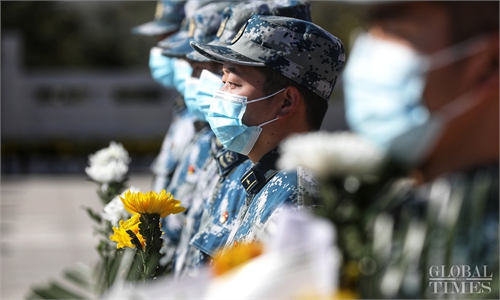Chinese software major Kingsoft apologizes after attachment of a Chinese martyr’s photo to a murder story draws ire

A Chinese actor plays Qiu Shaoyun in the TV series Going Across the Yalu River. Photo: Screenshot of the series
Chinese antivirus software Kingsoft Antivirus apologized on Tuesday after a murder story it recommended for readers falsely attached the photo of Qiu Shaoyun, a Chinese martyr who sacrificed his life in the War to Resist US Aggression and Aid Korea (1950-53) sparked outrage on the social media platforms.
Tuesday marked the 69th anniversary of the Chinese People's Volunteers soldier Qiu Shaoyun's death on October 12, 1952. However, Chinese netizens found a photo of the hero, who chose to burn to death rather than betray the positions of his fellow soldiers during the war, was being used by the software's push notification of a story about a murderer named Liu Xuebao who killed an innocent worker named Li Shibai by bombing a bridge and framed Li for the crime and built up a false reputation for himself in the 1960s.
Netizens lashed out against the company, demanding it a complete and sincere rectification.
Kingsoft made an apology on its Sina Weibo account on Tuesday, explaining that the story was pushed by a third-party provider who falsely used the photo of the martyr and Kingsoft's content scrutiny team failed to detect the mistake.
The company had ordered an internal scrutiny of the team involved, deleted the content on its platform and demanded the third-party provider to remove the link.
The story titled "a snake in the grass written into textbooks as a hero, truth came out 18 years later" described the case of an infamous murder Liu Xuebao who was also a soldier in the 1960s.
Liu bombed a bridge in Northwest China's Gansu Province on December 17, 1967, and killed the innocent forest farm worker Li Shibai nearby.
As the only survivor from the explosion, Liu claimed that Li had planned to blow up the bridge and that he got severely injured for stopping Li. Li was framed as a destroyer while Liu had since been appreciated as a hero until 1985 when Liu was given a life sentence after his crime was exposed.
Global Times


